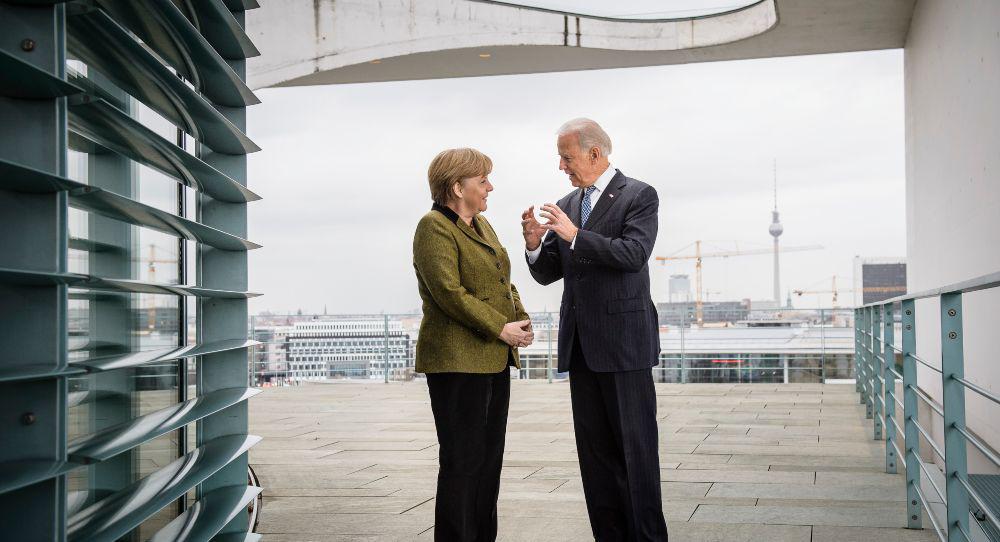Since becoming German chancellor back in November 2005, Angela Merkel has seen three American presidents go. This will not be the case with U.S. President-elect Joe Biden, who takes office in January 2021.
Because Germany is Europe’s most important country and Merkel its most important leader, Biden’s team doesn’t have much time to tackle some thorny issues with her. The chancellor will likely leave office about nine months after Biden enters the White House. Before then, on December 31, 2020, Merkel will have ended her last six-month stint as the EU’s rotating president.
It has been six months plagued by the coronavirus pandemic (literally), by Hungary and Poland’s toxic blackmail to stop the introduction of a rule-of-law mechanism by blocking EU funds designed to support member states hard hit by the virus, and by Brexit negotiations swamped in London by infighting in UK Prime Minister Boris Johnson’s government.The next six months could provide Merkel with more headaches. Much will depend on Biden’s approach to Europe in general and Germany in particular.
Unlike the outgoing U.S. President Donald Trump, who had only disdain for the European Union, a particular dislike for Merkel, and delight over Brexit, Biden is the opposite.
The president-elect supports a strong Europe. He appreciates Merkel’s role in Ukraine where she was instrumental in forging a (far from perfect) agreement to end the war in the eastern part of the country that is still occupied by pro-Russia forces.
And unlike Trump, Biden has made it clear that any Brexit deal must not compromise the Good Friday Agreement of 1999, which ended years of violence in Northern Ireland. That accord was made possible by the immense diplomatic input of the administration of former U.S. president Bill Clinton and of the British and Irish governments of the time.
Also unlike Trump, Biden warned London that any kind of U.S.-UK trade deal was off the table if Brexit undermined the Good Friday Agreement.
That means a lot to Merkel.
She never wanted Britain to leave the EU, partly because of the special economic, political, and diplomatic role London played in the EU, but also because of what it would mean for the balance of power in Europe. And she is a staunch defender of the Good Friday Agreement.
But Biden’s pro-European, pro-German stance comes with a price. And so it should.
If, as Merkel said in her congratulatory message to Biden, the “transatlantic friendship is indispensable if we are to deal with the major challenges of our time,” then she has to deliver on a few fronts.
The first is China.
Beijing has had an easy run in Europe. It has pursued a policy of divide and rule. China’s attraction as a huge market for several EU member states—especially Germany—went unchallenged until recently. Indeed, the EU’s response to Beijing’s crackdown on Hong Kong has been close to shameful. It’s as if trade ties mattered more than defending democrats protesting to protect their freedoms.
Trump’s trade war with China and his insistence that Europeans side with the United States in abandoning Chinese technology used for 5G mobile networks exposed big divisions inside the EU. For far too long, Merkel prevaricated.
Yes, she supported a special EU investment screening process that would help prevent China from acquiring sensitive strategic assets in Europe. But Chinese companies already have substantial shares in major European infrastructure projects, which potentially carries security risks. That is why her lenient attitude to 5G is puzzling.
If Merkel is committed to the transatlantic relationship and security, Berlin has to be far more active in pushing the EU toward agreeing a coherent policy on China—and one that dovetails or meshes with the incoming Biden administration.
Indeed, a common stance on China could be one of the major elements in modernizing the transatlantic relationship, which for far too long has focused on NATO. Furthermore, a united approach would weaken Beijing’s ability to divide the Europeans and deny it the chance to weaken EU-U.S. ties.
The second front Merkel must deliver on is Russia.
EU-U.S. ties have also been tested by Merkel’s unswerving support for Nord Stream 2, another contentious issue between Washington and Berlin.
This almost-completed second pipeline through the Baltic Sea will crown Russia’s goal of bypassing Ukraine to send gas directly to Germany. Trump threatened sanctions against firms involved in the construction of the project. Not only that: he had bipartisan support for this, a rare aspect of his presidency.
To increase pressure on Germany, the final draft of the U.S. defense policy bill for 2021 will extend sanctions to companies (and ships) that help complete the construction of the pipeline, in addition to those that provide insurance, reinsurance, testing, inspection, and certification services.
The German government and trade lobbies have criticized the sanctions, claiming they are interfering in European legislation and in Berlin’s sovereignty. In turn, the U.S. position and the antipathy to Trump has increased anti-American sentiment in Germany.
The Biden administration is unlikely to change course on Nord Stream 2 or Chinese 5G technology. But this is about Germany and the United States sharing a common threat perception. How Russia uses energy and China technology for geopolitics are two such threats.
As the Merkel era draws slowly to a close, she and Biden have a window to narrow the gap between Germany (and Europe) and the United States. This could push forward and restore trust in the transatlantic relationship.
This blog is part of the Transatlantic Relations in Review series. Carnegie Europe is grateful to the U.S. Mission to the EU for its support.







